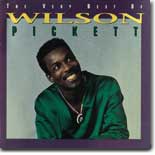|
Wilson Pickett
The Very Best of Wilson Pickett
Rhino |

When Wilson Pickett passed away a couple of
weeks ago, a lot of people were surprised. Most of the time, when a
performer is touring years after his hit records, that performer is
usually a mere shadow of what they once were. With Pickett, that was
never the case. He sounded as good, and sometimes better, than those
great records of 35-40 years ago. It’s somewhat hard to believe that
that he was 64 years old because he was still at the top of his game
before health problems forced his retirement last year. What better way
to pay tribute to “The Wicked Pickett” than to look at Rhino’s The
Very Best of Wilson Pickett.
Even though Pickett had been only been recording
for a couple of years before signing in 1965 with Stax Records (his
first hit with the Falcons, 1962‘s “I Found A Love,” complete with
Robert Ward‘s scintillating guitar, is present on this collection), his
first session for the label produced one of the best soul numbers ever. With Stax guitarist Steve Cropper, Pickett produced “In The Midnight
Hour,” and his delivery, thick with sexual tension (Let’s face it, he
wasn‘t waiting ‘til the Midnight hour to play checkers, folks) made it
the soul standard it is today.
He followed that success a few months later with
“634-5789,” and over the next few years Pickett had quite a hot streak,
with hits like “Land of 1000 Dances,” “Funky Broadway,” “Everybody Needs
Somebody To Love,“ and “Mustang Sally,” which ranks with “Midnight” as
Pickett’s biggest hit. Subsequently, Pickett teamed with Bobby Womack,
who contributed several other memorable songs to the Pickett catalog,
including “I’m In Love” and “I’m A Midnight Mover.”
The Very Best of also features a couple of
unlikely hits. Pickett’s rough and ready take on the Beatles’ “Hey
Jude” features some amazing guitar pyrotechnics by guitar legend Duane Allman, and his cover of the Archies’(!) “Sugar Sugar” gives the song a
brand new face, which is what one would actually hope would happen.
Shortly thereafter, at the beginning of the ’70s,
Pickett teamed with the Philadelphia producers Kenny Gamble and Leon
Huff, prior to their almost single-handedly revival of soul music back
in the mid and late ’70s. Pickett’s Gamble and Huff years are
well-represented by a couple of his later hits, “Don’t Let The Green
Grass Fool You” and the psychedelic “Engine Number 9.”
Through all the changes in styles over the years,
Pickett’s incredibly soulful vocals, seemingly on the verge of exploding
always carried the day. Jerry Wexler once said that while most singers
screamed sounds, Pickett screamed notes, and that part of his approach
never changed. Even through several “comeback“ efforts, including a
Motown release in the late ‘80s (American Soul Man) and his swan
song, 1999‘s It‘s Harder Now, Pickett sounded every bit as strong
as on those early ‘60s singles. In the world of soul music, he was
truly one of a kind and will be missed greatly.
--- Graham Clarke